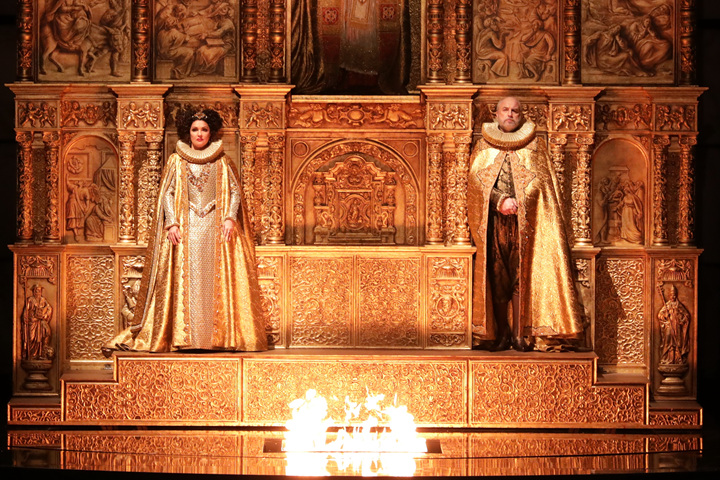| Opera Reviews | 30 April 2024 |
Musically La Scala's season opener is a triumphby Silvia Luraghi |
|
Verdi: Don Carlo |
|

Anna Netrebko (Elisabetta), Michele Pertusi (Filippo II)
|
|
|
This season’s opening night at Milan’s Teatro alla Scala featured Giuseppe Verdi’s Don Carlo, a favorite season opener having been shown at opening night eight other times from 1868 to 2008. The edition chosen this year was the 1884 four acts' adaptation that Verdi prepared specifically for La Scala, without the first act of the original French version (which, by the way, has never been heard sung in the original language in Milan). Opening night this year coincided with the UNESCO declaration of Italian lyric opera as a Cultural Heritage of Humanity, as general manager Dominique Meyer was proud to announce before the curtain opened. I was at the second performance, a matinée on Sunday 10th. The new production was directed by Lluis Pasqual, with sets designed by Daniel Bianco and costumes by Franca Squarciapino. The set designer placed a huge cylindrical structure at center stage. The cylinder opened revealing the various settings of the action, among which the golden and imposing high rise facade adorned with niches where the king and the queen appear after the Autodafé. The scene then ends with unimpressive artificial flame burning on the foreground. The rich costumes gave a predominantly black color to the whole action. In this setting, the stage directions were mostly missing: the singers, left to their own resources, ended up standing at the front of the stage for most of the time with little movement. Also some unconventional ideas by the stage director looked quite pointless, as in the encounter with Eboli who hands over Elisabetta’s coffret to Philip at the opening of the third act, ostensibly after having consumed adultery. Much better was the musical side. In the title role, tenor Francesco Meli displayed a handsomely timbred, ringing voice, with some effort in the pianissimi, which were rather falsetti, but was on the whole a compelling interpreter. At his side, soprano Anna Netrebko was an authoritative Elisabetta, molding her darkly colored voice to express a variety of feelings, never forgetting her role as a queen. Bass Michele Pertusi was King Philip. The singer, audibly indisposed at opening night, was in better voice on Sunday, and depicted an authoritarian and often confused by his own stiffness. Especially touching was his aria “Ella giammai m’amò”, but I also found the confrontation with the Grand Inquisitor very compelling. The latter was bass Jongmin Park, who was perhaps not as impressive as other basses heard in the same role, but appropriately stood without an showing emotion against the king. Mezzo Elina Garanča was a stylish Eboli and showed an impressive high register, with solid coloratura in the Veil Song. As Rodrigo, baritone Luca Salsi sang with commitment and with no vocal flaws. In the pit, Maestro Riccardo Chailly offered a deep and insightful reading of the score, underlying the dark side of the opera, and provided a superb lead for both the orchestra and the singers. The performance was very successful: virtually all arias stimulated the immediate reaction of the audience that packed the sold out house. At the end, the singers and the conductor received a long ovation.
|
|
| Text ©
Silvia Luraghi Photo Brescia e Amisano © Teatro alla Scala |
|







